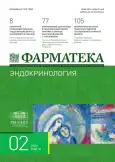Метформин предупреждает развитие фибрилляции предсердий
- Авторы: Леонова М.В.1
-
Учреждения:
- Межрегиональная общественная организация Ассоциации клинических фармакологов (Московское отделение)
- Выпуск: Том 31, № 2 (2024)
- Страницы: 60-64
- Раздел: Клинический опыт
- Статья опубликована: 23.05.2024
- URL: https://journals.eco-vector.com/2073-4034/article/view/632397
- DOI: https://doi.org/10.18565/pharmateca.2024.2.60-64
- ID: 632397
Цитировать
Полный текст
Аннотация
В настоящее время рассматривается практика перепрофилирования лекарственных препаратов, предназначенных для лечения одной нозологии, в качестве средства для лечения новых заболеваний или состояний. Так, метформин как производное бигуанида (диметилбигуанид), предназначенный как гипогликемическое средство для лечения пациентов с сахарным диабетом 2 типа, показывает эффективность в предупреждении и лечении фибрилляции предсердий (ФП). Накоплено множество данных, свидетельствующих о различных эффектах метформина помимо гипогликемического действия, в частности кардиопротективное. В основе кардиопротекции лежит активация 5’-аденозинмонофосфат-активируемой протеинкиназы (AMPK), что помогает сохранять/генерировать АТФ, предотвращать некроз/апоптоз, уменьшать окислительный стресс и воспаление. В экспериментальных работах показано, что метформин предотвращает неблагоприятное структурное и электрическое ремоделирование предсердий, предупреждая развитие ФП. Проведено несколько когортных исследований, в которых у пациентов, применявших метформин, отмечается снижение риска развития эпизодов ФП и увеличение выживаемости, а при сравнении с другими гипогликемическими препаратами (производные сульфонилмочевины, тиазолидиндион, ингибиторы α-глюкозидазы, ингибиторы дипептидилпептидазы, агонисты рецепторов глюкагоноподобного пептида-1) именно в группе метформина наблюдался значимо меньший риск развития ФП. По результатам транскриптомного анализа для метформина получены данные, демонстрирующие препарат в качестве кандидата на перепрофилирование препарата для лечения ФП. На данном этапе первостепенное значение имеют дальнейшие исследования надлежащего качества для выяснения положительного влияния метформина на сердечные аритмии.
Ключевые слова
Полный текст
Об авторах
М. В. Леонова
Межрегиональная общественная организация Ассоциации клинических фармакологов (Московское отделение)
Автор, ответственный за переписку.
Email: anti23@mail.ru
ORCID iD: 0000-0001-8228-1114
SPIN-код: 3281-7884
д.м.н., профессор, член-корреспондент РАЕН
Россия, МоскваСписок литературы
- Rojas L.B., Gomes M.B. Metformin: an old but still the best treatment for type 2 diabetes. Diab Metab Syndr. 2013;5(1):6. doi: 10.1186/1758-5996-5-6.
- Rena G., Lang C.C. Repurposing metformin for cardiovascular disease. Circulation. 2018;137(5):422–24. doi: 10.1161/CIRCULATIONAHA.117.031735.
- UK Prospective Diabetes Study (UKPDS) Group. Effect of intensive blood glucose control with metformin on complications in overweight patients with type 2 diabetes (UKPDS 34). Lancet. 1998;352:854–65.
- Lamanna C., Monami M., Marchionni N., Mannucci E. Effect of metformin on cardiovascular events and mortality: a meta-analysis of randomized clinical trials. Diab Obes Metab. 2011;13(3):221–28. doi: 10.1111/j.1463-1326.2010.01349.x.
- Han Y., Xie H., Liu Y., et al. Effect of metformin on all-cause and cardiovascular mortality in patients with coronary artery diseases: a systematic review and an updated meta-analysis. Cardiovasc Diab. 2019;18(1):96. doi: 10.1186/s12933-019-0900-7.
- Varjabedian L., Bourji M., Pourafkari L., Nader N.D. Cardioprotection by metformin: beneficial effects beyond glucose reduction. Am J Cardiovasc Drugs. 2018;18(3):181–93. doi: 10.1007/s40256-018-0266-3.
- Driver C., Bamitale K.D.S., Kazi A., et al. Cardioprotective Effects of Metformin. J Cardiovasc Pharmacol. 2018;72(2):121–27. doi: 10.1097/FJC.0000000000000599.
- Nantsupawat T., Wongcharoen W., Chattipakorn S.C., et al. Effects of metformin on atrial and ventricular arrhythmias: evidence from cell to patient. Cardiovasc Diab. 2020;19:198. doi: 10.1186/s12933-020-01176-4.
- Hindricks G., Potpara T., Dagres N., et al.; ESC Scientific Document Group. 2020 ESC Guidelines for the diagnosis and management of atrial fibrillation developed in collaboration with the European Association for Cardio-Thoracic Surgery (EACTS): The Task Force for the diagnosis and management of atrial fibrillation of the European Society of Cardiology (ESC) Developed with the special contribution of the European Heart Rhythm Association (EHRA) of the ESC. Eur Heart J. 2021;42(5):373–498. doi: 10.1093/eurheartj/ehaa612.
- Wang A., Green J.B., Halperin J.L., Piccini J.P.Sr. Atrial fibrillation and diabetes mellitus: JACC review topic of the week. J Am Coll Cardiol. 2019;74(8):1107–15. doi: 10.1016/j.jacc.2019.07.020.
- Chan Y.H., Chang G.J., Lai Y.J., et al. Atrial fibrillation and its arrhythmogenesis associated with insulin resistance. Cardiovasc Diab. 2019;18(1):125. doi: 10.1186/s12933-019-0928-8.
- Casaclang-Verzosa G., Gersh B.J., Tsang T.S. Structural and functional remodeling of the left atrium: clinical and therapeutic implications for atrial fibrillation. J Am Coll Cardiol. 2008;51(1):1–11. doi: 10.1016/j.jacc.2007.09.026.
- Li B., Po S.S., Zhang B., et al. Metformin regulates adiponectin signalling in epicardial adipose tissue and reduces atrial fibrillation vulnerability. J Cell Mol Med. 2020;24(14):7751–66. doi: 10.1111/jcmm.15407.
- Fu X., Pan Y., Cao Q., et al. Metformin restores electrophysiology of small conductance calcium-activated potassium channels in the atrium of GK diabetic rats. BMC. Cardiovasc Disord. 2018;18(1):63. doi: 10.1186/s12872-018-0805-5.
- Burla A.K., Lobato N.S., Fortes Z.B., et al. Cardiac fibrosis and vascular remodeling are attenuated by metformin in obese rats. Int J Cardiol. 2013;165(3):483–87. doi: 10.1016/j.ijcard.2011.09.012.
- Chang S.H., Wu L.S., Chiou M.J., et al. Association of metformin with lower atrial fibrillation risk among patients with type 2 diabetes mellitus: a population-based dynamic cohort and in vitro studies. Cardiovasc Diab. 2014;13:123. doi: 10.1186/s12933-014-0123-x.
- Liou Y.S., Yang F.Y., Chen H.Y., Jong G.P. Antihyperglycemic drugs use and new-onset atrial fibrillation: a population-based nested case control study. PLoS One. 2018;13(8):e0197245. doi: 10.1371/journal.pone.0197245.
- Ostropolets A., Elias P.A., Reyes M.V., et al. Metformin Is associated with a lower risk of atrial fibrillation and ventricular arrhythmias compared with sulfonylureas: an observational study. Circ Arrhythm Electrophysiol. 2021;14(3):e009115. doi: 10.1161/CIRCEP.120.009115.
- Lal J.C., Mao C., Zhou Y., et al. Transcriptomics-based network medicine approach identifies metformin as a repurposable drug for atrial fibrillation. Cell Rep Med. 2022;3(10):100749. doi: 10.1016/j.xcrm.2022.100749.
- Metformin for Atrial Fibrillarion Trial (MAFT). ClinicalTrials.gov Identifier: NCT05878535. URL: https://classic.clinicaltrials.gov/ct2/show/NCT05878535.
Дополнительные файлы









